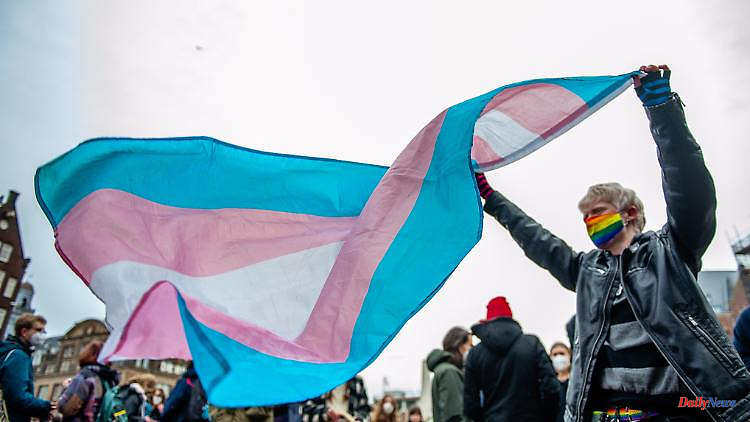Every day LGBTIQ in Germany are hostile and attacked, this is confirmed by crime statistics. Many attacks are not even reported. The consequences of discrimination can sometimes be life-threatening for those affected.
A month ago, a group of young people in Berlin-Neukölln said that a 40-year-old person was first insulted and then knocked unconscious by a group of young people in Berlin-Neukölln. A week later, a trans* woman was waiting at a tram stop in Berlin's Lichtenberg district when, according to a police report, she was verbally attacked by a young man. At the end of April, a 43-year-old reported that a passer-by homophobically insulted him, pushed him to the ground and injured him. Three cases from the past month, three times the federal capital - and only a fraction. The LGBT catalogs these homophobic and trans*phobic hate crimes, at least the ones that are reported in the media.
The Federal Ministry of the Interior registered a total of 782 hate crimes against LGBTIQ in 2020, a drastic increase of 36 percent compared to the previous year. LSBTIQ (lesbian, gay, bisexual, trans, inter, queer) is a collective term for all people who do not identify as heterosexual. There is a reason why Berlin - after all, a self-declared LGBTIQ freedom zone - appears particularly frequently in the statistics. Because police reports expressly mention a homophobic or trans*phobic background. This is not the case in other states.
But anyway, those affected by hate crimes rarely report it, according to the "Berlin Monitoring of Transphobic and Homophobic Violence." According to this, many fear discrimination by the police themselves. On the other hand, attacks "still often go unreported because they are part of the everyday experiences of those affected," the study continues. The number of unreported cases is therefore likely to be significantly higher. The perpetrators: according to the investigation, mostly male.
So hate crime against LGBTIQ is ubiquitous. Attacks on trans* people stand out in particular. Around a quarter of the crimes in 2020 can be attributed to this – a relatively high number. The generic term trans* gathers people who were assigned a gender at birth with which their gender identity does not correspond. The asterisk after it should include all genders, regardless of whether the person identifies as male, female, or outside of the binary gender order.
"We know from studies that trans* people experience discrimination much more often in public," says Stefan Timmermanns from the Frankfurt University of Applied Science in an interview with ntv.de. They are often easier to recognize than gays, lesbians or bisexuals and stand out in the street scene, explains the professor of sex education and diversity in social work. "That leads to more discriminatory reactions."
The thinking of many people manifests itself in a binary gender order. Anything that deviates from this tends to be interpreted as irritation or an insult to one's own masculinity or femininity. "Then you have to question your own gender identity. That scares some people and they react with hostile reactions," says Timmermanns. He attributes this to his own insecurity in gender identity. "Anyone who is sure of their own masculinity or femininity can also put up with a trans* person in public and say: We can both live happily side by side."
Perpetrators often lack self-reflection. But according to the Timmermanns, the level of education, strict religiosity and extreme political attitudes also play a role. For those affected, this results in a permanent state of alert. The expert describes it as "the fear of being discriminated against just as I'm about to get on the bus or walking around the corner, and I can't control it. It can just happen to me, anytime, anywhere." It's called minority stress, an additional burden for people who deviate from the white, heterosexual majority society. This sometimes has serious consequences.
A study led by Timmermanns shows that LGBTIQ suffer from mental or chronic illnesses significantly more often than average. The professor attributes this to the minority stress, which usually lasts for years. Even if the study is not representative, it can be concluded from the results "that the participants in our study have an almost six times higher risk of suicide than the general population," warns Timmermanns.
For the trans* people in the "How are you?" study, the risk is even ten times higher. This coincides with the information given by the interviewees about their experience of discrimination. "Trans* people are not only discriminated against more often, but also where they actually hope for support. For example in the medical field or in their own families," says Timmermanns.
Does society have a blind spot here? At least in counseling institutions, the topic - despite its drama - does not seem to have really arrived. Timmermanns therefore calls for more professionally competent bodies that are specially trained in LGBTIQ issues such as coming out or transition, i.e. gender reassignment. "And when it comes to suicide prevention, there needs to be another reflection on how to respond better to queer clients," says Timmermanns.
Furthermore, the social debate, especially on trans* issues, is still characterized by ignorance and prejudice. "Concerned parents or opponents take up a lot of space in the media discussion, while trans* people themselves are hardly visible," states the expert. Education must start in schools. "You don't always have to treat the topic from the perspective of sexual orientation or gender identity, but you can also view it as a fight for civil liberties." The ministries of education are asked to train teachers and make material available.
Societal progress is slow, but it is there. As of 2018, trans* people are no longer included in the World Health Organization's ICD-11 catalog of diseases under the category "Mental and Behavioral Disorders". Even if this official pathologization has disappeared, a stigma remains in the medical field. In Germany, for example, the "Transsexual Law" from the 1980s stipulates the circumstances under which people can change their first name and gender. For years there has been criticism of the lengthy and cost-intensive procedure, which penetrates into the most intimate areas of people's lives. The traffic light government has announced that it will introduce a lower-threshold "self-determination law" instead. It should be up by summer.
May 17th is the International Day Against Homophobia, Biphobia, Interphobia and Transphobia. At the same time, its existence is a testimony, because discrimination is part of the everyday reality of life for LGBTIQ people. This sometimes causes enormous suffering and can even be fatal in the end. Nevertheless, another perspective is important to Timmermanns, which is often neglected in research and reporting. "It also has to be shown that many people are very happy and content with being queer or trans*, have found a place in society and can deal well with the minority stress they experience." Positive examples of biographies that have successfully survived a life crisis and have grown from it can encourage other people to develop a positive self-image. "We should just pay more attention to that in the future."
6












